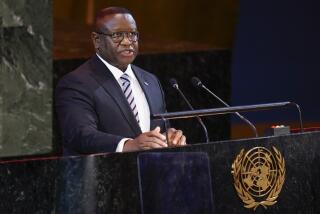Ex-Leader, Official Slain in Ivory Coast Troop Revolt
- Share via
ABIDJAN, Ivory Coast — The interior minister and a former junta leader in Ivory Coast were killed Thursday after rebellious armed forces attacked government and security installations across the West African nation, officials said.
President Laurent Gbagbo, who was visiting Italy when the violence erupted, declared the rebellion had been halted after hours of heavy gunfights and mortar exchanges left at least 10 rebel soldiers and seven loyal police dead.
However, military sources said renegade soldiers remained in control of the cities of Bouake and Korhogo.
Gbagbo’s government has been struggling to ease ethnic and political tensions and calm a restive military in this country, which has been on edge since Gen. Robert Guei seized power in a coup in 1999.
Guei was forced out after elections in 2000.
On Thursday, government troops killed Guei when his car refused to stop for a roadblock in downtown Abidjan, the commercial capital, paramilitary police Sgt. Ahossi Aime said.
Officials accused Guei of attempting to retake power.
“Gen. Guei, the main instigator, was killed this morning,” Defense Minister Moise Lida Kouassi said in a national address. “The situation is under control across the country.” Kouassi said a nationwide curfew had been imposed until Tuesday.
The fighting, which began at 3 a.m., was apparently precipitated by Gbagbo’s announcement two weeks ago that he was forcing the retirement of about 750 soldiers from units that were known for their loyalty to Guei.
While many of the men left the army, the officials said, they refused to turn in their weapons, apparently stashing them for use in the uprising.
Officials in Abidjan said the rebels were armed with automatic rifles, machine guns and rocket-propelled grenades.
Interior Minister Emile Boga Doudou apparently was killed in a rebel attack on his residence, police said.
Loyalist military sources in Korhogo and Bouake said rebel troops appeared to be in control of both cities.
Rebels in Bouake said they had killed the local military commander and abducted the country’s sports minister, who was visiting the area.
The trouble comes just as Ivory Coast was trying to regain its political balance following several years of turmoil. Gbagbo recently won plaudits from donors and diplomats for including opposition members in his new Cabinet.
The fledgling African Union condemned the fighting and reminded member countries that they have pledged to oppose unconstitutional changes of government. But many diplomats fear Ivory Coast could fall into anarchy because of the deep ethnic and religious splits underlying its political divide.
The main fault line is between the south, mainly loyal to Gbagbo, and the north, loyal to opposition leader former Prime Minister Alassane Ouattara. Ouattara was banned from contesting the 2000 poll because of doubts as to his nationality.
More to Read
Sign up for Essential California
The most important California stories and recommendations in your inbox every morning.
You may occasionally receive promotional content from the Los Angeles Times.













